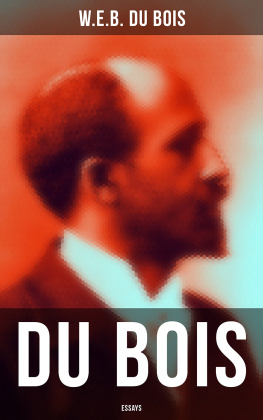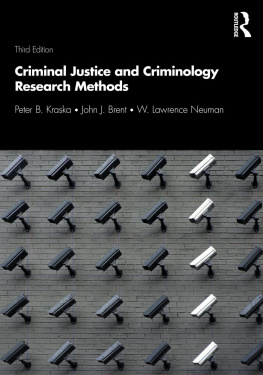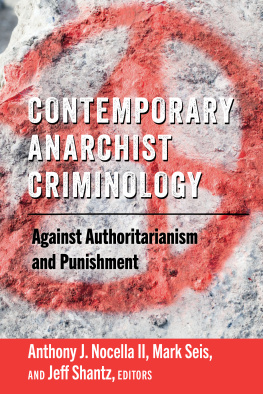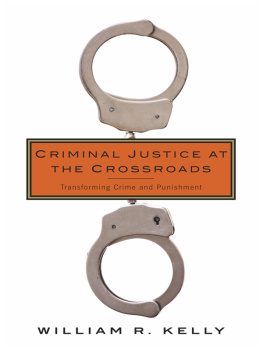W. E. B. DU BOIS ON CRIME AND JUSTICE
Interdisciplinary Research Series in Ethnic, Gender and Class Relations
Series Editor: Biko Agozino, Cheyney University of Pennsylvania, USA
This series brings together research from a range of disciplines including criminology, cultural studies and applied social studies, focusing on experiences of ethnic, gender and class relations. In particular, the series examines the treatment of marginalized groups within the social systems for criminal justice, education, health, employment and welfare.
Also published in this series
Democratic Policing in Transitional and Developing Countries
Edited by Nathan Pino and Michael D. Wiatrowski
ISBN 0 7546 4719 6
Modernization and the Crisis of Development in Africa
The Nigerian Experience
Jeremiah I. Dibua
ISBN 0 7546 4228 3
W. E. B. Du Bois on Crime and Justice
Laying the Foundations of Sociological Criminology
SHAUN L. GABBIDON
Pennsylvania State University at Harrisburg, USA
First published 2007 by Ashgate Publishing
Published 2016 by Routledge
2 Park Square, Milton Park, Abingdon, Oxon OX14 4RN
711 Third Avenue, New York, NY 10017, USA
Routledge is an imprint of the Taylor & Francis Group, an informa business
Copyright Shaun L. Gabbidon 2007
Shaun L. Gabbidon has asserted his right under the Copyright, Designs and Patents Act, 1988, to be identified as the author of this work.
All rights reserved. No part of this book may be reprinted or reproduced or utilised in any form or by any electronic, mechanical, or other means, now known or hereafter invented, including photocopying and recording, or in any information storage or retrieval system, without permission in writing from the publishers.
Notice:
Product or corporate names may be trademarks or registered trademarks, and are used only for identification and explanation without intent to infringe.
British Library Cataloguing in Publication Data
Gabbidon, Shaun L., 1967-
W. E. B. Du Bois on crime and justice : laying the foundations of sociological criminology.
(Interdisciplinary research series in ethnic, gender and class relations)
1. Du Bois, W. E. B. (William Edward Burghardt), 1868-1963
- Knowledge - Criminology 2. Crime - Sociological aspects
3. Criminology
I. Title
364'.092
Library of Congress Cataloging-in-Publication Data
Gabbidon, Shaun L., 1967-
W. E. B. Du Bois on crime and justice : laying the foundations of sociological criminology / by Shaun L. Gabbidon.
p. cm. -- (Interdisciplinary research series in ethnic, gender, and class relations)
Includes bibliographical references and index.
ISBN-13: 978-0-7546-4956-4 1. Du Bois, W. E. B. (William Edward Burghardt), 1868-1963--Political and social views. 2. Criminology--United States--History. 3. Crime--Philosophy--History. 4. Crime and race-- United States.
I. Title.
HV6022.U6G33 2007
364.973--dc22
2006031602
ISBN-13: 978-0-7546-4956-4(hbk)
Contents
For my three sons
Jini, Jalen and Julian
Foreword
The function of a foreword has become rather blurred in recent decades. They are often omitted and such preliminary comments are absorbed into a preface or introduction. Yet, forewords can serve to provide a cursory, even if non-scholarly glimpse generally by an outsider to the project of what is to follow. As such, the foreword is apt to be a personal note written by one who sees the book and author in a larger context, and perhaps possessing some individual awareness or relationship to the author.
Dr. Gabbidon first came to my attention while a doctoral student in criminology at Indiana University of Pennsylvania. At that time, I was the coordinator of the Ph.D. program, and although he managed to stay clear of my classes, I became aware of him as an enterprising and aspiring scholar. Dr. Gabbidon still remains most notable around the halls where he was once a graduate student, not just because of his scholarship, but clearly because of his dogged determination to complete the Ph.D. He lived in Baltimore during his doctoral student days and commuted the four hour trip to southwest Pennsylvania by automobile, not an easy task in winter months.
For some time now, he has held a passion for unraveling in novel directions the long and complex life of Du Bois. Du Boisian scholars have dotted the academic map, yet few of the writers have recognized his potential relevance and linkages to the still developing discipline of criminology. W. E. B. Du Bois, recognized and awarded for decades as a Renaissance man by serious thinkers, has not been clearly and adequately scrutinized as a criminologist, even if after his death at the age of ninety-five in 1963. For much of Du Boiss career, criminology had barely made it to the curricula of even a small number of major universities in the United States. What was discussed in regards to crime and justice was from the perspective of anthropology, economics, political science, history, and sociology, among other overlapping social sciences. As an inexhaustible writer, it was in such multiple disciplines as these that Du Bois excelled, even if often from behind the scenes as a black writer and researcher in a predominately black college.
Historical analysis is not everyones cup of tea. But, it is a necessary and an illuminating way to retrospectively push further the academic horizons. By better understanding how early scholars perceived of their world, and how they reacted to their own set of problems, allows contemporary thinkers to better gauge the present. Scrutinizing the writings of Du Bois provides an opportunity to assess the trials and tribulations of one of the nations most accomplished writers and social activists in light of some of the same issues and dilemmas addressed today by modern theoretical criminologists.
In part, because Du Bois happened to be African-American, his life work which spans from the re-construction period following the Civil War to the 1960s provides a fertile collection of publications which are of direct relevance to the slippery issues of crime and justice. Furthermore, his life and writings furnish a perspective of one who understood the plight of the victim during the first half of the 20th century. Focusing on the works of Du Bois allows for a rather rare comparative view of criminological issues. First, often overlooked is the fact that Du Bois offers a unique historical or temporal perspective of sociology and criminology. That is, as an individual scholar, with near century-long societal observations, we see his visions of socio-cultural change over many decades. Du Bois was in a position to witness firsthand accounts of the plight of minorities to include African Americans, women, and immigrants during the development of social science in the United States. Second, because of his wide-ranging travels, he developed a trans-national perspective not always held by writers of his era. Also, Du Bois was without question acutely aware of the contrast between informal and formal social control. He provides extensive reports of the pros and cons of official and governmental social control, contrasted to unofficial and community-based controls, which can also be seen from varying vantage points of either the victim or the offender.








